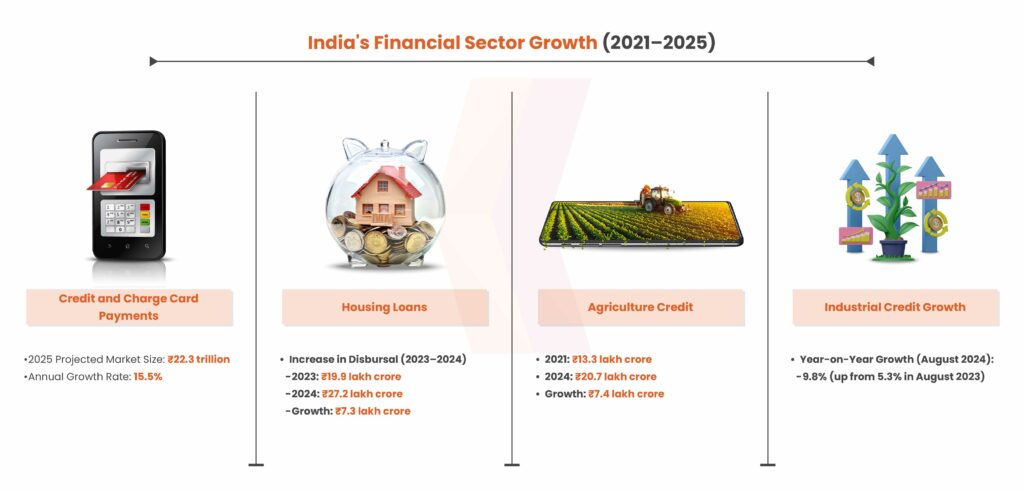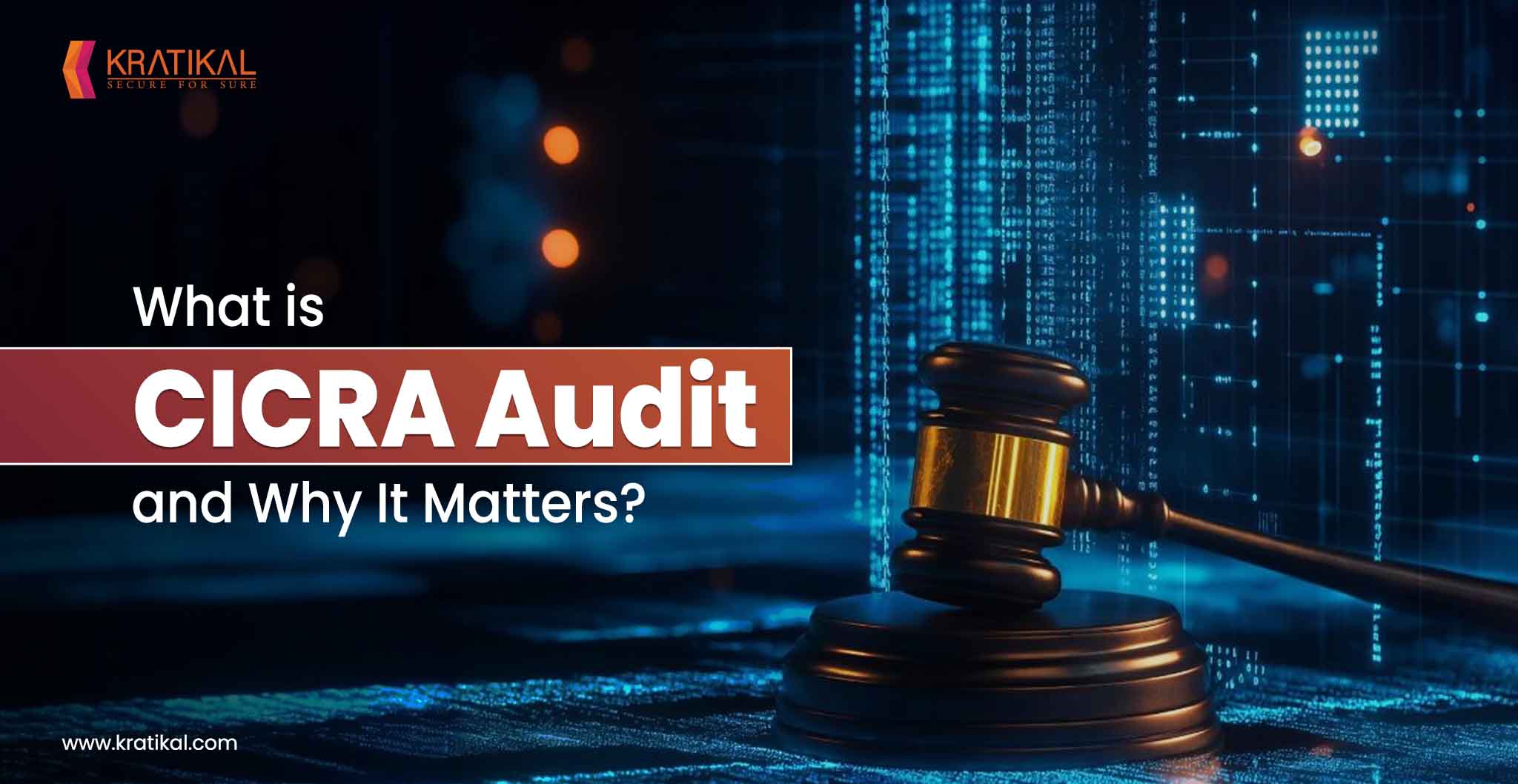Credit Information Companies (Regulation) Act was introduced in India in 2005. It was for organizations that handle customers’ credit information to promote transparency in the credit system as well as protect sensitive data. CICRA Audit makes sure the organization follows the guidelines. The following statistics show the need for concrete guidelines for credit organizations.
By the beginning of 2025, India’s credit and charge card payments market is expected to be Rs 22.3 trillion, with a growth rate of 15.5%. There was an increase in housing loan disbursal from Rs 19.9 lakh crore in 2023 to Rs 27.2 lakh crore in 2024. In agriculture, the credit increased from Rs 13.3 lakh crore in 2021 to Rs 20.7 lakh crore in 2024. Not only that, credit to the industry grew 9.8% year-on-year in August 2024, up from 5.3% a year earlier. Such a growing dependence on credit amplifies the need for any credit institution or credit information company to get their CICRA audit done and achieve compliance.

Table of Contents
What is CICRA Audit?
CICRA Audit refers to inspecting whether the rules and regulations as specified in the CIC laws are appropriately followed by the credit information companies, credit institutions (like banks), and specified users (such as companies that use credit information). Reserve Bank of India is assigned the authority to inspect organizations for the same. Provided below are some important information about the CIC Act 2005:
CIC Laws
Credit Information Companies Regulations, 2006, and Credit Information Companies Rules, 2006 along with CICRA 2005 collectively referred to as CIC Laws.
CICRA 2005
Credit Information Companies (Regulation) Act 2005, also referred to as CICRA or CIC Act, was enacted by Parliament to provide some definite rules and guidelines for credit information companies. The main purpose behind CICRA is to –
- regulate the functioning of credit information companies (CIC)
- setting up a framework for collecting, processing, and sharing credit information
- facilitate better credit risk management
- help institutions make informed lending decisions
Book Your Free Cybersecurity Consultation Today!
CIC Regulations 2006
After CICRA 2005, the Reserve Bank of India and the Government of India formulated certain regulations for credit information companies. It includes the list of specified users apart from those mentioned in the Act. It further includes the procedure of registration of companies as CICs, lists of businesses in which CICs can engage, collection and furnishing of credit information followed by privacy rules, and the maximum fees that a CIC can charge.
CIC Rules 2006
After the CIC Regulations 2006, RBI and the Indian Government issued the CIC Rules 2006. The document includes the procedure of appeal, safeguard, and security steps to be taken by credit institutions, CICs, and specified users to ensure accuracy and data protection, rules for prohibition from unauthorized access/use/disclosure followed by fidelity and secrecy rules.
What Does RBI Inspect?
RBI checks the operations and records of the CIC, banks, or any other authorized user as and when the central bank wants or when asked by the government to do so. After the inspection, RBI shares the findings with the organization concerned. It is the duty of the organization to provide the necessary information and documents at the time of inspection. Also, inspectors can question employees, directors, and officers under oath to get honest answers about the organization’s operations. The cost of inspection needs to be borne by the organization itself.
Power and Responsibilities of a CICRA Auditor
- The auditor’s responsibility is to verify whether the company has sent the correct information to the RBI. In case, they haven’t, they must inform the RBI about it.
- The RBI can tell auditors what to do during the audit if it thinks it’s necessary to protect the public or the credit system.
- RBI as and when required can order a special audit to closely examine certain transactions or periods. Moreover, the auditor is bound to follow the RBI’s instructions and report the findings.
- The CIC should pay the auditors for their work, and the RBI decides how much the auditors should be paid. However, the payment is based on the work involved.
How Can An Organization Become CICRA Compliant?
Credit Institutions, CICs, or any specified users who want to carry out their CICRA Audit need to get in touch with Cert-In Empanelled Auditors. They also need to be CISA (Certified Information Systems Auditor) certified to get their audit done. A CICRA certification will help an organization to prove that they are inclined with rules, regulations, and guidelines as provided in the Act. Provided below is Kratikal’s approach to performing CICRA Audit:
CICRA Audit – Kratikal’s Approach
- Scope Drafting – Kratikal’s audit approach begins with laying down the scope of the audit. This ensures that all the areas relevant to CICRA are included.
- Creating the Audit Plan – Once the scope is decided, the next step involves creating an audit plan. It includes the audit’s scope, aim, and criteria. The CICRA Audit plan also includes the nature, timing, and scope of tests of controls, network security measures, and other procedures.
- Finalizing the Audit Schedule – An audit schedule is prepared with the consent of all parties. Kratikal finalizes the audit schedule for CIRCA while coordinating with the organization team to minimize disruption and ensure thorough coverage.
- Auditing – The auditors from Kratikal will examine the pre-implemented documentation and controls of the organization after the audit schedule is finalized. Thereafter, a detailed audit is carried out which includes examining data handling practices, security measures, and compliance with CICRA regulations.
- Reporting and Attestation – Kratikal’s auditing team will then record its findings and provide necessary suggestions for improvement. The minor and significant non-conformities will also be recorded. Finally, a summary report will be created along with the standard checklist used during auditing.
CICRA Audit – Why Does It Matter?
Achieving compliance through a CICRA audit ensures that the related organizations comply with the laws, protect their consumers, improve operational efficiency as well as promote fair competition.
- Achieve Regulatory Compliance: Audits ensure that credit institutions, CICs, and specialized users follow the rules, regulations, and guidelines as mentioned in the Act.
- Improve Efficiency: CICRA Audit can identify areas for improvement, leading to cost savings and also better service delivery.
- Transparency: The audit ensures that the organization associated with handling the credit information of customers is transparent in its functioning. It also promotes trust with customers and regulators.
- Ensure Protection of Consumers: CICRA audits help make sure organizations deliver their services and products at fair prices. It also helps safeguard consumer data.
- Fair Competition: The audit ensures all credit institutions, CICs, and specialized users follow the same rules. It helps foster healthy competition in the market.
- Risk Mitigation: Such audits help detect fraud, mismanagement, as well as other risks that could harm the organization or consumers.
- Informed Policy: Regulatory bodies use audit results to adjust rules and improve the industry.
Get in!
Join our weekly newsletter and stay updated
As India witnesses its credit market expand, the importance of the CICRA audit is undebatable. Also, credit institutions, CICs, and specialized users who do not comply with CICRA are subject to fines and penalties.
Through CICRA Audit organizations can not only ensure their compliance but also contribute to a healthier, more secure credit ecosystem in India.
FAQs
- What are the CIC laws?
The Credit Information Companies (Regulation) Act of 2005, along with the rules and guidelines released, namely the Credit Information Companies Regulations, 2006, and Credit Information Companies Rules, 2006, are collectively called the CIC Laws.
- What is the role of a credit information company?
A Credit Information Company (CIC) collects, processes, and shares credit and financial information about borrowers for its members, such as credit institutions. It provides credit scoring and research services and can charge fees for sharing information. CICs also register members, regulate their participation, and perform other tasks to ensure proper operation per the Reserve Bank’s regulations.
- What is a CICRA audit?
CICRA Audit refers to an in-depth examination of whether the rules and guidelines laid down in the CIC Act 2005, CIC Regulations 2006, and CIC Rules 2005 are properly followed. CICRA guidelines must be followed by credit information companies, credit institutions, and the users listed in CIRCA.








Leave a comment
Your email address will not be published. Required fields are marked *